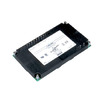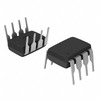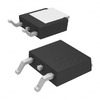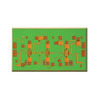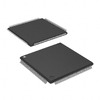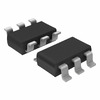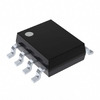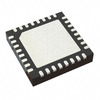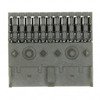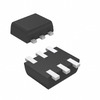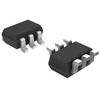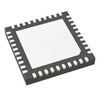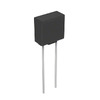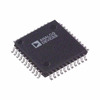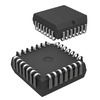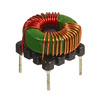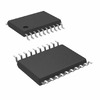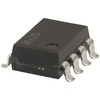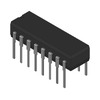STM32F303CCT6 Microcontroller Guide: Footprint, Alternatives, and Benefits
In the world of embedded systems, microcontrollers like the STM32F303CCT6 stand at the heart of countless technological innovations, from industrial automation to consumer electronics. This versatile device, part of the renowned STM32 family, is designed to tackle high-performance tasks with its robust processing power and a rich array of peripherals. In this article, we’ll explore the STM32F303CCT6’s key features, such as its advanced timers, powerful analog components, and clock management system, and show how these attributes make it a go-to solution for you to develop efficient, reliable, and flexible systems. Whether you're designing a motor control system or integrating complex sensor data, the STM32F303CCT6 offers the performance and adaptability to meet the challenges of modern applications.Catalog

STM32F303CCT6 Overview
The STM32F303CCT6 microcontroller excels in high-performance embedded applications, combining robust processing capabilities with flexible peripheral selections. Its LQFP-48 package supports operations up to 72 MHz, housing 40 KB of RAM across 48 pins. This makes it adaptable to various demanding settings. Its extensive array of analog and digital features boasts a low-power RTC, dual DAC channels, specialized motor-control timers, operational amplifiers, rapid ADCs, and an assortment of timers and comparators. Such a diverse toolkit allows it to thrive in fields ranging from industrial automation to consumer electronics.
Exploring Alternatives and Equivalents
STM32F303CCT6 3D Model and Footprint

Technical Parameters STM32F303CCT
|
Product Attribute |
Attribute Value |
|
Manufacturer |
ST
Microelectronics |
|
Package
/ Case |
LQFP-48 |
|
Packaging |
Tray |
|
Length |
10
mm |
|
Width |
7.2
mm |
|
Height |
1.45
mm |
|
Core |
ARM
Cortex M4 |
|
Supply
Voltage |
2 V
~ 3.6 V |
|
Data
Bus Width |
32
bit |
|
Program
Memory Size |
256
kB |
|
Data
RAM Size |
40
kB |
|
Operating
Temperature |
-40°C
~ 85°C |
|
Data
RAM Type |
SRAM |
|
Mounting
Style |
SMD/SMT |
|
Number
of I/Os |
37
I/O |
|
Number
of ADC Channels |
1
Channel |
|
Number
of Timers/Counters |
8
Timer |
|
Product
Type |
ARM
Microcontrollers - MCU |
STM32F303CCT6 Features
Data Handling
The STM32F303CCT6 microcontroller shows remarkable proficiency in managing data, thanks to its 12-channel Direct Memory Access (DMA) and an adaptable interconnect matrix. This setup effectively facilitates data exchange between peripherals, easing the CPU's load and boosting the system's responsiveness. When dealing with real-time data processing, such enhancements can lead to notable improvements in performance stability and operational efficacy.
Clock Management
This microcontroller incorporates a wide-ranging clock management system with multiple oscillators. It includes a 32 kHz crystal oscillator perfect for precise timing and a 40 kHz internal oscillator ideal for low-power tasks. Seamlessly toggling between these oscillators allows for flexible power strategies, especially valuable in energy-conscious applications such as portable devices.
I/O and Memory
Equipped with 87 high-speed I/O ports that tolerate 5V signals, the STM32F303CCT6 easily connects to diverse external components. Its memory ranges from 128-256KB of Flash and 40KB of SRAM, accommodating complex applications with substantial storage needs and fast data access requirements. These I/O and memory configurations are assets in scenarios that prioritize dependable data throughput and rapid processing.
Timer Capabilities
The microcontroller boasts intricate timing functions, such as watchdog timers for system dependability and basic timers for task scheduling. These functionalities ensure precision in operations requiring strict timing sequences and secure measures that bolster operational safety and effectiveness.
Operational Amplifiers and Voltage Range
Integrated operational amplifiers enable the processing of analog signals across a voltage span of 2.4 to 3.6 V. This capacity for flexibility supports varied electrical environments, serving applications like sensor data acquisition and signal conditioning, where adaptability in voltage is requisite.
Capacitive Sensing for Touch Inputs
The chip supports capacitive sensing on 24 channels, facilitating touch input abilities. This aspect is advantageous in creating user interfaces and interactive devices, fostering a responsive and engaging touch experience. Incorporating this touch-sensing capability simplifies design efforts by minimizing the necessity for additional components.
Packaging Information
Packaging Format and Purpose
The STM32F303CCT6 comes in a 64-pin LQFP package, tailored for modern electronic needs. This choice is made for its ability to maximize space, boost durability, and manage heat effectively. The flat LQFP design excels in projects emphasizing compactness and efficiency, allowing for smooth integration into various circuits.
Tray Disk Packaging Advantages
Opting for tray disk packaging in mass production aligns with the industry's pursuit of efficiency and eco-friendliness. This method not only conserves space but also enhances the product's resilience against environmental factors. It significantly improves thermal conductivity, is used for high-performance applications, and supports automated production lines by offering consistent placement and handling, thus easing manufacturing processes.
Power Use
Analyzing Power Metrics
When designing energy-conscious systems, power use often becomes a central theme. Typically, metrics are established assuming peripheral components remain inactive unless otherwise specified, allowing for a thorough assessment of the system's power needs across different scenarios.
Configuration Influences
Phased Locked Loop (PLL) settings, clock rates, and I/O pin configurations are among those impacting power consumption significantly. Strategic adjustments in these settings can lead to notable reductions in energy use. Selecting clock rates that align with task requirements helps avoid wasteful energy consumption.
Memory Access and Optimization
Patterns of memory access, especially those aligned with the fHCLK frequency, are used for power efficiency. Techniques like employing low-power modes and activating memory selectively can dramatically cut down energy use. Actual examples highlight the link between detailed memory management and prolonged battery life in portable devices.
Attributes of the STM32F303CCT6
Memory Speed and Energy Considerations
The STM32F303CCT6 boasts 512KB of Flash and 80KB of SRAM, built for speed and energy-sensitive applications. It excels in low-power modes, perfect for battery-reliant devices. This balance invites innovation in portable technologies, allowing you to extend device usage and reliability. It often focuses on extending the device's lifespan and ensuring consistent performance.
Computational Prowess Using ARM Cortex-M4 and FPU
Equipped with an ARM Cortex-M4 core and a Floating-Point Unit (FPU), the STM32F303CCT6 supports complex computations efficiently. This capability boosts digital signal processing and intricate mathematical tasks. Industries benefit from such power in advancing automation and control systems, demonstrating its utility in deploying intricate algorithms.
Storage Adaptability with FSMC
The Flexible Static Memory Controller (FSMC) supports various static memory types, offering diverse storage solutions. This versatility aids in optimizing memory configurations for bespoke applications. Fields requiring tailored hardware solutions leverage this adaptability to align with specific application demands.
Processing Efficiency and System Resilience
Clocking at 72 MHz, the STM32F303CCT6 ensures swift data processing and system responsiveness. Its design incorporates features that guard against failures, preserving system integrity. This reliability is prized in serious settings where system downtime cannot occur. Safety mechanisms highlight the focus on maintaining operational consistency and reliability.
Usage Insights
Debugging with Precision Tools
Connect the embedded tracing macrocell skillfully for debugging tasks. This tool aids in unraveling software issues by tracking execution paths and capturing dynamic signal data. It needs an acute mind and a calculated approach for you to interpret large trace logs.
Safeguarding Data Through Backup
In processing endeavors, safeguarding data with secure backups is a sensible precaution. Automated backup solutions can significantly reduce data loss risks in environments where data integrity carries immense weight. Redundancy and cloud solutions are frequently used by professionals to facilitate rapid and reliable data recovery.
Clock Source Sync Configuration
Meticulously configuring clock source synchronization helps avoid discrepancies. Misaligned clocks can trigger disruptions with ripple effects on dependent systems. Best practices involve continuous monitoring using precision timing tools and routines to maintain synchronization harmony, seamlessly integrating components, and reducing latency concerns.
Securing Memory Access Permissions
Instituting solid memory access permissions blocks unauthorized data alterations and prominence security's role in protecting sensitive data. Strategies like access control lists and encryption are regularly applied in high-security contexts to maintain data integrity.
Peripheral Interface Initialization
Proper initialization of peripheral interfaces is used for stable communication. Misconfigurations may cause unpredictable device behavior and communication breakdowns. Experts in the field recommend a structured approach to interface setup, encompassing rigorous testing and thorough documentation. This not only promotes device compatibility but also simplifies troubleshooting.
Frequently Asked Questions [FAQ]
1. What is the operating temperature range of STM32F303CCT6?
The STM32F303CCT6 operates effectively between -40°C and 85°C. This temperature span supports reliability across diverse environments and contributes to the system’s adaptability and durability through varied conditions.
2. What is the IC equivalent of STM32F303CCT6?
Consider looking into models such as MK20DN32VLF5 and MK20DX64VLF5. Selecting among these options involves assessing specific project needs, understanding budgetary impacts, and planning for component availability to align with project specifics.
3. What are the program memory and data memory types of STM32F303CCT6?
This model incorporates Flash for program memory and SRAM for data storage. The dual use of Flash and SRAM ensures a harmonious blend of speed and retention, dynamic for you to focus on maintaining data integrity and optimizing program performance.
4. What are the main application areas of STM32F303CCT6?
The STM32F303CCT6 excels in industrial automation, medical devices, consumer electronics, and communication systems. Its robust performance and efficient interfacing are acknowledged in practical deployments, emphasizing the necessity of utilizing these features to boost system efficiency and enhance user experience.
About us
ALLELCO LIMITED
Read more
Quick inquiry
Please send an inquiry, we will respond immediately.

TL074CN Operational Amplifier: Pinout, Features, and Package Information
on September 30th

2N3773 Transistor: Features, Pinout, and Applications
on September 30th
Popular Posts
-

What is GND in the circuit?
on January 1th 2933
-

RJ-45 Connector Guide: RJ-45 Connector Color Codes, Wiring Schemes, R-J45 Applications, RJ-45 Datasheets
on January 1th 2486
-

Fiber Connector Types: SC Vs LC And LC Vs MTP
on January 1th 2079
-
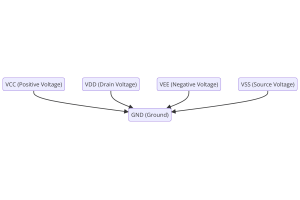
Understanding Power Supply Voltages in Electronics VCC, VDD, VEE, VSS, and GND
on November 8th 1872
-

Comparison Between DB9 and RS232
on January 1th 1759
-

What Is An LR44 Battery?
Electricity, that ubiquitous force, quietly permeates every aspect of our daily lives, from trivial gadgets to life-threatening medical equipment, it plays a silent role. However, truly grasping this energy, especially how to store and efficiently output it, is no easy task. It is against this background that this article will focus on a type of coin cell battery that may seem insignificant on the...on January 1th 1709
-
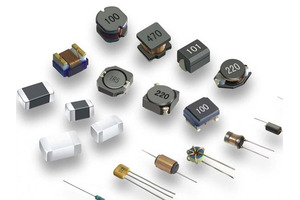
Understanding the Fundamentals:Inductance Resistance, andCapacitance
In the intricate dance of electrical engineering, a trio of fundamental elements takes center stage: inductance, resistance, and capacitance. Each bears unique traits that dictate the dynamic rhythms of electronic circuits. Here, we embark on a journey to decipher the complexities of these components, to uncover their distinct roles and practical uses within the vast electrical orchestra. Inductan...on January 1th 1649
-

CR2430 Battery Comprehensive Guide: Specifications, Applications and Comparison to CR2032 Batteries
What is CR2430 battery ?Benefits of CR2430 BatteriesNormCR2430 Battery ApplicationsCR2430 EquivalentCR2430 VS CR2032Battery CR2430 SizeWhat to look for when buying the CR2430 and equivalentsData Sheet PDFFrequently Asked Questions Batteries are the heart of small electronic devices. Among the many types available, coin cells play a crucial role, commonly found in calculators, remote controls, and ...on January 1th 1537
-

What Is RF and Why Do We Use It?
Radio Frequency (RF) technology is a key part of modern wireless communication, enabling data transmission over long distances without physical connections. This article delves into the basics of RF, explaining how electromagnetic radiation (EMR) makes RF communication possible. We will explore the principles of EMR, the creation and control of RF signals, and their wide-ranging uses. The article ...on January 1th 1532
-

CR2450 vs CR2032: Can The Battery Be Used Instead?
Lithium manganese batteries do have some similarities with other lithium batteries. High energy density and long service life are the characteristics they have in common. This kind of battery has won the trust and favor of many consumers because of its unique safety. Expensive tech gadgets? Small appliances in our homes? Look around and you'll see them everywhere. Among these many lithium-manganes...on January 1th 1500







